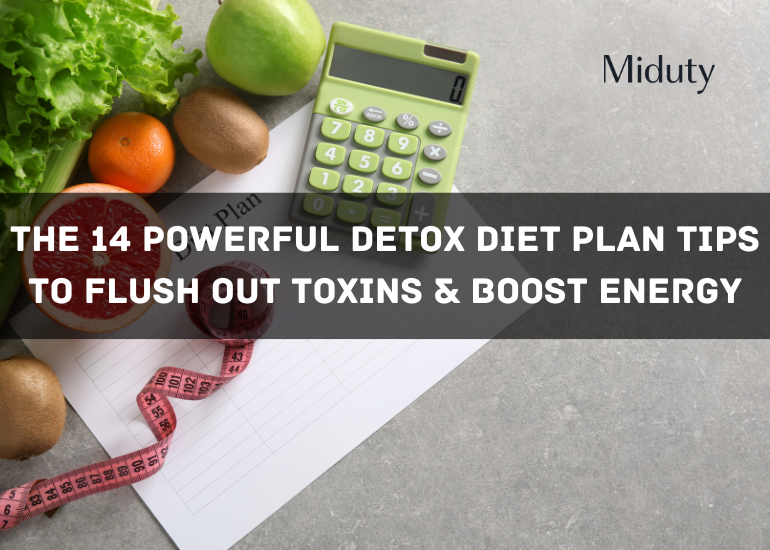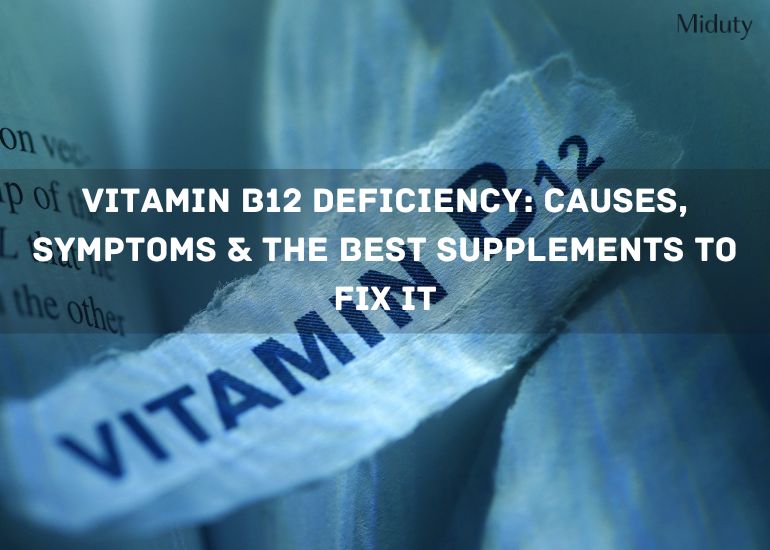
The 14 Powerful Detox Diet Plan Tips to Flush Out Toxins & Boost Energy
Key Takeaways-
1) Start your day with warm lemon water, and stay hydrated throughout the day with water infused with detoxifying ingredients like cucumber, mint, or ginger to enhance your body's cleansing process.
2) Did you know your liver filters over 1.4 liters of blood every minute?
3) Struggling with skin breakouts or mood swings? A detox diet can enhance your skin's natural glow and help stabilize your emotions by clearing out harmful toxins.
4) Want a stronger defense against illnesses? Detoxifying foods like garlic and citrus can strengthen your immune system and boost overall health.
5) Poor sleep can hinder detoxification. Learn how cutting out caffeine and incorporating magnesium-rich foods can improve your sleep quality and rejuvenate your body overnight.

Table of Contents
2. Final Thoughts on Detox Diets
4. References
Feeling off lately? Constant bloating, low energy, or not feeling your best might mean your body needs a reset. A detox diet isn't just a trend, it's a science-backed way to help your body eliminate toxins, restore balance, and improve overall health.
Every day, your body fights toxins from processed foods, pollution, and stress. Over time, these can overwhelm your natural detox systems, leading to fatigue, hormonal imbalances, and inflammation. [1]
Your liver works tirelessly, filtering 1.4 liters of blood every minute, while your kidneys process an incredible 50 gallons daily. [2] But when these systems are overloaded, they need extra support.
Eating detoxifying foods like leafy greens, beets, and cruciferous vegetables can enhance liver function and reduce oxidative stress. [3] Fiber-rich foods also nourish your gut microbiome, helping eliminate waste more effectively. [4]
Ready for a healthier, happier you? Let's dive into the best detox strategies and step-by-step plans!
The Best Detox Diet Plan for Removing Toxins
If you're ready to take the next step toward a healthier, more energized you, a detox diet can make a big difference. Here's how to get started with a simple, effective detox plan:
Step 1: Hydrate with Purpose

Start your day by sipping on a glass of warm water with freshly squeezed lemon juice. Lemon is rich in vitamin C, which supports the immune system and helps stimulate liver enzymes, which are essential for detoxification. Throughout the day, aim for 2-3 liters of water, adding cucumber, mint, or ginger to infuse your water with extra detoxifying benefits.
These ingredients aid digestion, help reduce inflammation, and support your body's natural detoxification processes. You may incorporate herbal teas such as nettle, dandelion root, or matcha tea, which support liver health and can increase antioxidant activity in the body.
Step 2: Focus on Clean, Whole Foods
A detox diet should focus on clean, whole foods that nourish your body. Leafy greens like spinach and kale are rich in chlorophyll, aiding toxin removal and digestion. Citrus fruits like lemons and oranges contain flavonoids that activate liver enzymes to support detoxification, while cruciferous vegetables like broccoli and Brussels sprouts enhance natural detox pathways. [5]
Healthy fats from avocados, chia seeds, and flaxseeds provide omega-3s, reducing inflammation and supporting detox. Fermented foods like kimchi, sauerkraut, and yogurt improve gut health and toxin elimination. [6]
Also Read: 21-Day Fatty Liver Diet Plan - What to Eat and What to Avoid?
Step 3: Digital Detox
In our hyper-connected world, constant exposure to screens can contribute to mental fatigue, stress, and decreased productivity. Taking time for a digital detox, such as reducing screen time or disconnecting from social media, allows you to recharge and focus on more grounding activities. Use the time you would normally spend on screens to engage in physical activity, such as walking or stretching, or to enjoy quality time with loved ones.
Quiet moments spent away from technology also give your mind a break, fostering better mental clarity and emotional well-being.
Step 4: Chelation Therapy
For individuals who have been exposed to heavy metals, chelation therapy can be an effective method of detoxification. This therapy uses chelating agents, like EDTA or DMSA, to bind to heavy metals such as lead, mercury, or cadmium, allowing them to be safely excreted from the body through urine. Chelation therapy can be particularly beneficial for individuals living in areas with high pollution, those working in industrial settings, or those with certain medical conditions.
However, it's important to consult with a healthcare professional before starting chelation therapy to ensure it's safe and appropriate for your needs.
Step 5: Prioritize Lymphatic Drainage

Your lymphatic system is integral to detoxification. It helps transport waste, toxins, and cellular debris out of the body. To support lymphatic health, incorporate practices that stimulate lymph flow, such as dry brushing, which involves using a firm-bristled brush on dry skin to promote circulation and toxin elimination. Another method is gentle massage, which can help encourage lymphatic drainage and improve circulation.
Rebounding, or jumping on a mini-trampoline, is another effective technique to stimulate lymph flow, as the up-and-down motion helps move lymph fluid through the body, enhancing detoxification.
Your lymphatic system serves as your body's natural cleaning system, flushing out cellular waste, debris, and toxins from your tissues.
Step 6: Incorporate Activated Charcoal
Activated charcoal is a powerful, naturally occurring substance that has been used for centuries to treat poisoning and help detoxify the body. It works by binding to toxins, chemicals, and waste products in the digestive system and preventing them from being absorbed into the bloodstream. It's best to take it after physical activities, like exercise or sauna sessions, when the body is in a state of natural detoxification.
Be sure to avoid taking it alongside other supplements or medications, as it can bind to essential nutrients and reduce their effectiveness.
Step 7: Cryotherapy
Cryotherapy, also known as cold therapy, involves exposing the body to cold temperatures for short periods, typically through cryo chambers or ice baths. This process has been shown to help reduce inflammation, promote fat burning, and stimulate the body's natural detoxification processes. Cold exposure helps activate fat cells, which encourages the body to release stored toxins.
For those without access to cryo chambers, cold showers or ice baths can offer similar benefits, stimulating circulation and enhancing the body's detox pathways.
Step 8: Superfoods for Detox
Superfoods are nutrient-dense foods that are particularly beneficial for supporting detoxification. Turmeric, for example, contains curcumin, a powerful antioxidant that enhances liver enzyme activity and supports the detox process. You may add veggies or lentils. [7] Garlic is known for its ability to support glutathione production, a key antioxidant in the body's detoxification process. Beets are rich in betalains, which support liver detoxification, while also promoting healthy digestion and reducing inflammation.
Step 9: Boost Glutathione Levels
Glutathione is one of the most important antioxidants in the body, helping to neutralize free radicals and support liver detoxification. To boost glutathione levels, consider adding foods like avocados, strawberries, and fish to your diet, as these are known to enhance the production of glutathione.
Supplements such as glutathione, NAC (N-acetyl cysteine), and alpha-lipoic acid can also help increase your body's natural glutathione production. Maintaining optimal glutathione levels is essential for reducing oxidative stress, supporting immune function, and protecting cells from damage.
Step 10: Add Alkaline Foods
Alkaline foods, such as cucumbers, and lemons, help balance the body's pH levels, reducing acidity and promoting a more alkaline state. This is important because an acidic environment can contribute to inflammation and hinder detoxification. Alkaline foods also improve hydration and support healthy digestion, helping to keep you feeling energized and refreshed.
Also Read: Top Alkaline Foods to Include in your Diet for a Healthy Life
Step 11: Optimize Sleep

Sleep is when the body undergoes its most significant detox processes. During deep sleep, the brain clears out toxins that accumulate throughout the day, and the liver works to eliminate waste from the body. Try to maintain a regular sleep schedule, avoid late-night meals, and create a calming nighttime routine.
Magnesium supplements, calming herbal teas like chamomile or valerian root, and reducing screen time before bed can all help promote relaxation, making it easier to fall into a deep, restorative sleep. [8]
Step 12: Minimize EMF Exposure
Electromagnetic fields (EMFs), emitted by electronic devices like smartphones, laptops, and Wi-Fi routers, can disrupt the body's natural detoxification processes. Long-term exposure to EMFs has been associated with stress, fatigue, and inflammation.
To minimize EMF exposure, consider unplugging devices at night, using EMF shields, and spending more time outdoors to reconnect with nature. Walking barefoot on natural surfaces can help neutralize the effects of EMFs and support your body's detoxification processes.
Step 13: Avoid Toxic Cookware

The cookware you use can contribute to your body's toxic load. Non-stick pans coated with chemicals like PFOA (perfluorooctanoic acid) and plastics containing BPA (bisphenol A) can leach harmful substances into your food, increasing your exposure to toxins. [9] Opt for safer cookware options such as stainless steel, glass, or cast iron, which are free from harmful chemicals and won't leach toxins into your meals.
Step 14: Consider Fasting
Intermittent fasting, which involves cycling between periods of eating and fasting, has gained popularity for its ability to promote weight loss, improve metabolism, and support detoxification. During fasting periods, the body has a chance to rest from digestion and focus on cellular repair and detoxification.
A 16:8 fasting schedule (16 hours of fasting and 8 hours of eating) is one of the most common approaches. Fasting can also help reduce inflammation, improve insulin sensitivity, and give your digestive system time to recover.
Also Read: 7 Foods/Ingredients for High Protein Vegetarian Diet That Will Help You In Weight Loss
Final Thoughts on Detox Diets
A detox diet is not just a quick fix; it's about supporting your body's natural processes and helping it function optimally. By incorporating clean, nourishing foods and eliminating toxins, you can enhance your overall wellness. Remember, detoxing is about balance giving your body what it needs to function at its best while reducing the harmful substances that can hold you back.
The journey towards a healthier, more energized you starts with making small, mindful choices. Whether it's boosting your liver function, improving digestion, or simply feeling more rejuvenated, a detox diet can help reset your body and mind. Embrace the power of detox, and you will start feeling the benefits both inside and out.

Frequently Asked Questions on Detox Diets
Q1. How can I detox my body in 7 days?
A 7-day detox diet can help rejuvenate your body by eliminating toxins. Start with a detox diet plan that includes whole, nutrient-dense foods like fruits, vegetables, and lean proteins, while avoiding processed foods and sugars. Incorporate plenty of water to support the detox process and feel revitalized before and after the detox diet.
Q2. Is fasting good for detox?
Fasting can be an effective way to detox, allowing your body to rest and focus on eliminating waste. However, it's important to follow a balanced detox diet plan during fasting to ensure you're still getting essential nutrients. For long-term benefits, consider the best detox diet that includes intermittent fasting and nutrient-dense foods.
Q3. How to flush and detox your body?
To flush toxins from your body, focus on drinking plenty of water and consuming antioxidant-rich foods. A detox diet plan focused on hydration, fiber, and cleansing foods like green leafy vegetables can help your body naturally detoxify. Adding herbs like dandelion root can also support liver health, promoting a cleaner system.
Q4. What is the best diet to cleanse the liver?
The best detox diet for the liver includes foods that support liver function, such as leafy greens, cruciferous vegetables, and high-quality proteins. Consider a detox diet plan that includes specific liver-supporting ingredients like turmeric, garlic, and beets.
Q5. How many days of detox diet?
A detox diet typically lasts anywhere from 3 to 7 days, depending on your goals. A 7-day detox diet plan is ideal for a thorough cleanse, while shorter detox periods can be beneficial for maintaining health. For significant results, a before and after detox diet will show improved energy, digestion, and skin health.

References







